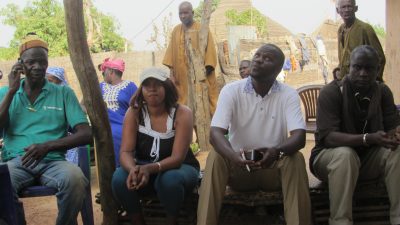By
Alpha Jallow
A group of journalists from different media organisations have ended a three day field visit to the Senegalese village of Wassadou in the region of Tambacounda. The journalists, who are also members of a network of media professionals on land reforms and governance, organised the field visit to familiarise themselves with issues arising from land disputes in rural and semi-urban areas.
The visit, organised by civil society groups such as Actionaid Senegal and APPROVAC (a local organization helping banana farmers on the banks of the river Gambia) came in the wake of a controversial land dispute between the communities of Wassadou and a franco-Lebanese and Senegalese national who is claiming several thousands hectares of land from the people of Wassadou and its environs.
Gilbert Khayyat is reclaiming approximately 3,123 hectares of land, which his late grandfather bought with a land title deed in 1932; in addition to the claim that the inhabitants of Wassadou and thirteen other villages have been exploiting the land for several years without his consent.
However, the villagers state that the land was granted to them by the state several decades ago when many villages near the Niokolokoba game reserve were relocated to safer sites.
According to residents of Wassadou, the land dispute between them and the Khayyat family started in 2009 and each year as the the rainy season approaches, the issue resurfaces.
This visit involving civil society organisations will help journalists to collect information on the land disputes that take place in this town, located in one of five areas of intervention by Actionaid, which trains its people on the technical issues on land tenure legislations and advocacy.
It is to be noted that the main activities of the population in this part of Senegal are agriculture and livestock.
“Some skirmishes took place recently and four people were arrested and then released. They were even heard last week by the investigating judge”, Khadim Diop, responsible for Actionaid program in the area of ??Missirah in the region of Tambacounda, stated.
”Wassadou is one of thousands of cases that you can find in the area” said Mamadou Ciss, head of the office of Actionaid in Tambacounda.
Amadou Salif Tall, President of the network of journalists on land reform and governance, said that the visit was timely and will help journalists to diagnose problems emanating from land disputes in Senegal, while at he same time stressing the need for media professionals to descend on the ground in search of relevant information on the issue of land reforms and governance.
The network aims to ”inform and sensitise all stakeholders on land tenure” explained Mr. Tall, noting that the regions of Tambacounda and Kedougou are interesting in this regard, due to the presence of forests and mines, among other things.
“In the current context, it is important to ask the question: how a land title deed of 1932 continues to create problems in the lives of rural dwellers” and how land reform can make a “durable solution” to this kind problem, echoed Sambakhé Zacharia, head of advocacy at Actionaid Senegal.
It is important to note also that in the late 1970s, more than fourteen villages, which formed the current population of Wassadou, were evicted from the basement of the Niokolokoba Park and relocated to this portion of land believed to be the property of the Khayyat family.



No Comments Yet!
You can be first to comment this post!